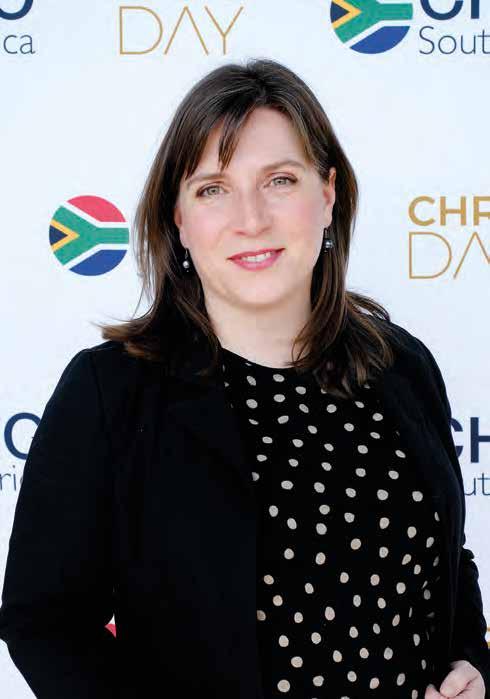
8 minute read
Bongiwe Ntuli: Exploring new horizons
EXPLORING NEW HORIZONS
A passionate globetrotter, CFO Bongiwe Ntuli sees opportunities in new places, and goes for them. It was no different when she saw potential in the struggling Jet brand, as well as in Tapestry, and knew TFG could deliver on this potential. By Caylynne Fourie
Advertisement


Ayear after Bongiwe Ntuli joined one of South Africa’s foremost retailers, TFG, as its CFO, Covid-19 hit. Like many retailers at the time, TFG felt the impact of the pandemic across its operations since the initial lockdown in March 2020, and in just three months, the group’s consolidated retail turnover declined 43 percent. “April was all about scenario planning, tight cash flow management and ensuring we had sufficient liquidity. So the treasury team and I worked with local banks to shore up our balance sheet, as we didn’t know how long the lockdowns would last,” Bongiwe explains. They also embarked on a capital raising project, relying on their shareholder relationships. “The TFG strategy is robust and has received great shareholder support over the years, so the rationale for the capital raise was sound,” she says, adding that the investment case for the capital raise was based on the underlying business being strong. However, there was material uncertainty at the time as a result of the pandemic with trading disruptions and risk expected to continue in all three of the group's major operating territories. “It was prudent and necessary to reduce the group’s indebtedness, which would strengthen its relative position through the recovery and insulate the balance sheet against potential future shocks,” Bongiwe explains. Because the shareholders were supportive of TFG’s strategy and its investment case, as well as the attractively priced rights offer, the capital raise was oversubscribed by 2.3 times, and TFG raised R3.8 billion.
With a strong balance sheet and a “war chest”, the company was ready to take advantage of any opportunities that came from the pandemic, and look for further organic growth opportunities. “Jet and Edgars went into business administration around the same time and I knew TFG would be the best home for Jet,” she adds. “Jet was for sale for R380 million, and for a business that once made a turnover of R8 billion, we knew that it had great potential with the right owner.”
She explains that TFG had always played into the low, middle and upper segments of the retail markets, and Jet allowed the group to grow their market share further into the value segment. “This is a good segment to play in when the economy isn’t doing well.”
Now, two years later, Jet contributes over R5 billion in turnover to TFG and has had payback of less than 12 months. “All the surprises have been positive – it's a strong brand that’s loved by the customers and has a strong management team,” Bongiwe says.
Creating potential
Along with strict cash management, one of TFG’s strategic imperatives during Covid-19 was to look after their employees. The group, which employs more than 30,000 store staff worldwide, took the decision to keep on paying their staff their basic costs throughout the lockdowns. But putting their employees first is not new for TFG, Bongiwe says. One of the company’s values is to make a meaningful difference to its people’s lives by providing training, skills and experience, which in turn drives economic growth and development. “Over the past five years, the group has spent over R1 billion to develop local manufacturing capability together with the South African government and close to R600 million on learnerships, bursaries and education related activities. The number of training interventions have been about 630,000 over the past few years,” Bongiwe says. The company’s CSI flagship project, SEW Good, brings on board previously unemployed women and upskills and trains them. At TFG’s Prestige factory, these women manufacture the iconic purple blanket, which is donated to disaster-affected communities.
Another one of the retailer’s CSI projects is Mhinga Village in Limpopo, where they run learnerships. At
the end of the 12-month program, about 80 percent of the students manage to finish and graduate, and 70 percent of those are put in long term employment within the group. TFG also offers hundreds of internships a year to bring people up to the right level of skill and experience. These interns are then absorbed into the company’s store environments worldwide.
Uniquely positioned for good
Passionate about M&A, Bongiwe says that what makes her most proud of the Jet acquisition is the fact that it saved the jobs of over 5,000 store workers, as well as the jobs in supplier companies. “Job creation and the retention of jobs are critical and is one of TFG’s strategic ESG pillars. South Africa’s unemployment rate is one of the highest in the world and we have taken it upon ourselves to work with the government to create better lives for South African people.” She explains that, aside from the obvious economic consequences the unemployment rate has for the country, it also has a devastating social impact. “We saw this during the civil unrest that occurred in July 2021.”
During this period, 199 of TFG’s stores were looted across KwaZulu-Natal and Gauteng. “For precautionary measures, we closed about 1,000 stores during that week to avoid further looting, and in just that week alone our turnover was impacted by up to R700 million,” Bongiwe says. However, about 180 of the 199 stores that were looted are back in commission again and making a healthy turnover and profits. She explains that TFG is in the fortunate position to create meaningful job opportunities and this demonstrates just how strongly the company believes in playing its part in realising the potential of South Africa and its people. “It excited me to be part of an acquisition that not only brought turnover for TFG, fitted with our strategy of growing the value segment, but also assisted in saving thousands of jobs.” During the pandemic, TFG’s unique position as one of South Africa’s only local manufacturers also worked in its favour. “TFG’s investment in its own manufacturing facilities and local sourcing initiatives helped us to reduce our reliance on imports and thereby insulated us to a certain extent from the global supply chain disruptions,” Bongiwe says. Over and above this, local quick-response manufacturing allowed the retailer to respond to the best-selling commodities on relatively short lead times, resulting in less markdowns and improved gross margins.
Seeking new potential
TFG also recently acquired Tapestry, which owns Coricraft, Volpes and Dial-a-Bed. “We’ve always had @Home, but it only made up two to three percent of the furniture and home retail industry,” Bongiwe says. “By acquiring Tapestry, which is almost the same size as our @Home business, we were able to grow our market share in this segment and play a meaningful role in the mid to upper consumer home sector.”
Tapestry also shares the TFG values of manufacturing and sourcing local products, which Bongiwe explains was one of the biggest drawcards for her when considering the acquisition. “As a leading retailer in local quick response manufacturing in South Africa, the Tapestry business model resonated with TFG’s ESG purpose, and bolstered our social upliftment ambitions.” Bongiwe and TFG management are always on the lookout for good M&A opportunities, and explains that, even now, in the midst of the economic turmoil, TFG continues to grow its market share and will open approximately 500 outlets in its 2023 financial year alone.

“We continue to assess acquisition opportunities on a regular basis and will only pursue these if they are in line with our strategy and meet our stringent investment criteria,” she says. “The opportunistic acquisition of the jet business is an example of finding and executing on an attractive acquisition opportunity in what was a very difficult economic climate at the time.”
Global focus
TFG is a global retailer with strong successful brands in the UK and Australia as well. “We have strong, capable management teams in place in both these regions and they are responsible for implementing and executing on their strategies with the full support of our group supervisory board, as well as South African resources as and when required,” Bongiwe says. She explains that these businesses also emerged strongly from the Covid-19 pandemic, and are well positioned for growth. “Both businesses delivered record levels of profitability in the 2022 financial year, and they continued to perform strongly in the first quarter of the 2023 financial year.” She adds that all TFG’s brands are thriving in the current environment, with some of their mid to upper segment brands seeing double digit growth.
Globetrotter
Apart from weekly Teams meetings with the global teams to review performance, set budgets, do forecasts and offer any other support they require, Bongiwe visits the UK and Australia operations at least four times a year. However, as a self-declared globetrotter, she enjoys travelling to these countries, and takes holidays overseas when she has time.
She explains that the highlight of her travels this year was the opportunity to go to Wimbledon and watch the men’s final. “It was a thrilling experience.” When she isn’t working, which she says is not often, she likes to curl up on her couch at home , read a nice book or watch documentaries and movies on Netflix. She also enjoys visiting her parents and siblings in KwaZulu-Natal and Gauteng. l










